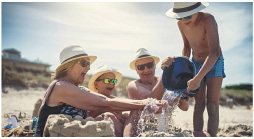 Skin cancer is the most common form of cancer in the U.S. About one in five Americans is likely to develop skin cancer in their lifetime.
Skin cancer is the most common form of cancer in the U.S. About one in five Americans is likely to develop skin cancer in their lifetime.
The majority of all skin cancers are caused by overexposure to ultraviolet, or UV, light. These rays come from the sun (a natural source) and artificial sources, such as tanning beds and some halogen, fluorescent and incandescent lights or lasers.
Skin cancer most often develops on areas of the body frequently exposed to the sun, including the face, lips, ears, neck, scalp, chest, arms and hands. However, it can also form on areas that typically receive minimal direct sunlight.
Staying protected from the sun is a year-round necessity, especially in the Sunshine State. With the proper steps, you can help protect yourself and your family so everyone can enjoy their favorite outdoor activities safely.
Skin Cancer Basics
There are three main types of skin cancer – basal cell, squamous cell and melanoma, which is the most serious type.
Basal cell skin cancer is the most prevalent and least dangerous type. It generally appears on the head, neck or upper torso and grows slowly. Spots, blemishes, freckles and moles are signs of sun-damaged skin. They are usually harmless, but if you notice them changing, see a doctor.
Squamous cell skin cancer usually appears as a thickened, red, scaly spot that may bleed easily, crust or ulcerate. Commonly found on areas of the skin that are most often exposed to the sun, it can spread to other parts of the body over time.
Melanoma skin cancer develops when melanocytes, the cells that give the skin its color, start to grow out of control. Melanoma can develop anywhere on the skin but usually starts on the chest and back in men and on the legs in women. It is close to twenty times more common in Caucasians than in African Americans.
While melanoma accounts for only about 1% of skin cancers, it is the cause of a large majority of skin cancer deaths. If not detected and treated early, it is more likely to spread to other body parts. When detected early, the five-year survival rate is 99%.
Risks and Warning Signs of Skin Cancer
Most moles, brown spots and other growths on the skin are usually harmless; however, it is a good idea to have an annual skin check by a professional healthcare provider. Older adults, people who are fair-skinned or those with many moles are generally at greater risk, so it is essential to know your skin well and recognize and report any changes you see to your doctor.
An easy way to recognize if a mole or other skin lesion may be cancerous is to remember the ABCs of skin cancer:
Asymmetry: one area of the mole does not match the other
Border: is irregular
Color: is not uniform
Diameter: greater than 6 mm (the size of a pencil eraser)
Evolving: size, shape or color changes
Slip, Slop, Slap & Wrap to Reduce Your Risk
The good news is, in addition to being the most common type of cancer, skin cancer is also the most preventable.
Did you know that, on average, a person’s risk for melanoma doubles if they have had five or more sunburns? Research indicates that protecting your skin before you turn 18 can cut your risk of some types of skin cancer by as much as 78%. Even just one blistering sunburn in childhood or adolescence more than doubles a person’s chances of developing melanoma later in life.
Here are the best ways to reduce your risk of skin cancer:
• Whenever you are in the sun, even on cloudy days, wear sunscreen with a sun protection factor (SPF) of 15+
• Do not use tanning beds or sunlamps
• Avoid exposure to harmful chemicals, including tobacco products
• Watch for any changes in moles or new suspicious skin growths
• Schedule an annual skin check with a healthcare professional
WORLD-CLASS CANCER TREATMENT, CLOSE TO HOME
About Florida Cancer Specialists & Research Institute, LLC: (FLCancer.com) Recognized by the American Society of Clinical Oncology (ASCO) with a national Clinical Trials Participation Award, Florida Cancer Specialists & Research Institute (FCS) offers patients access to more clinical trials than any private oncology practice in Florida. The majority of new cancer drugs recently approved for use in the U.S. were studied in clinical trials with Florida Cancer Specialists participation.* Trained in prestigious medical schools and research institutes, our physicians are consistently ranked nationally as Top Doctors by U.S. News & World Report.
Founded in 1984, FCS has built a national reputation for excellence that is reflected in exceptional and compassionate patient care, driven by innovative clinical research, cutting-edge technologies and advanced treatments, including targeted therapies, genomic-based treatment and immunotherapy. Our highest values are embodied by our outstanding team of highly trained and dedicated physicians, clinicians and staff.
Florida Cancer Specialists & Research Institute
Delray Beach
5130 West Linton Boulevard, Suite B-4
Delray Beach, FL 33434
Lake Worth
4801 S. Congress Avenue, Suite 400,
Lake Worth, FL 33461
Palm Beach Gardens
3401 PGA Blvd, Suite 200
Palm Beach Gardens, Florida 33410
Wellington North
1037 S State Road 7, Suite 303
Wellington, Florida 33414
West Palm Beach
1309 North Flagler Drive
West Palm Beach, Florida 33401
For more information, visit FLCancer.com
 South Florida Health and Wellness Magazine Health and Wellness Articles
South Florida Health and Wellness Magazine Health and Wellness Articles




